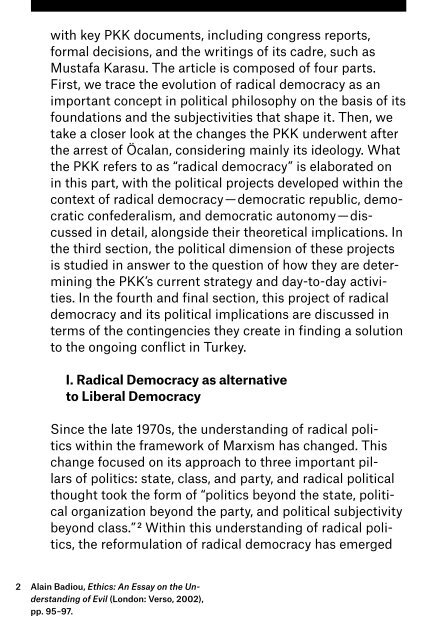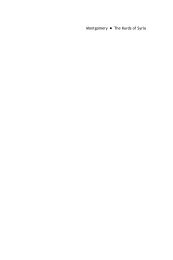Stateless Democracy
1RHiH4Y
1RHiH4Y
You also want an ePaper? Increase the reach of your titles
YUMPU automatically turns print PDFs into web optimized ePapers that Google loves.
with key PKK documents, including congress reports,<br />
formal decisions, and the writings of its cadre, such as<br />
Mustafa Karasu. The article is composed of four parts.<br />
First, we trace the evolution of radical democracy as an<br />
important concept in political philosophy on the basis of its<br />
foundations and the subjectivities that shape it. Then, we<br />
take a closer look at the changes the PKK underwent after<br />
the arrest of Öcalan, considering mainly its ideology. What<br />
the PKK refers to as “radical democracy” is elaborated on<br />
in this part, with the political projects developed within the<br />
context of radical democracy — democratic republic, democratic<br />
confederalism, and democratic autonomy — discussed<br />
in detail, alongside their theoretical implications. In<br />
the third section, the political dimension of these projects<br />
is studied in answer to the question of how they are determining<br />
the PKK’s current strategy and day-to-day activities.<br />
In the fourth and final section, this project of radical<br />
democracy and its political implications are discussed in<br />
terms of the contingencies they create in finding a solution<br />
to the ongoing conflict in Turkey.<br />
I. Radical <strong>Democracy</strong> as alternative<br />
to Liberal <strong>Democracy</strong><br />
Since the late 1970s, the understanding of radical politics<br />
within the framework of Marxism has changed. This<br />
change focused on its approach to three important pillars<br />
of politics: state, class, and party, and radical political<br />
thought took the form of “politics beyond the state, political<br />
organization beyond the party, and political subjectivity<br />
beyond class.” 2 Within this understanding of radical politics,<br />
the reformulation of radical democracy has emerged<br />
2 Alain Badiou, Ethics: An Essay on the Understanding<br />
of Evil (London: Verso, 2002),<br />
pp. 95–97.<br />
as the main alternative to liberal democracies of the West.<br />
It has given a fresh impetus to social and political movements,<br />
from liberation movements in Latin America to<br />
anti-globalist demonstrations in the United States and<br />
Europe. Though we could talk about a wide spectrum of<br />
radical views of democracy beyond the liberal version, in<br />
critical academia, the most well known of these views is<br />
political theorists Ernesto Laclau and Chantal Mouffe’s<br />
reconsideration of the concept of democracy in their pioneering<br />
study Hegemony and Socialist Strategy: Towards a<br />
Radical Democratic Politics (1985). In it, Laclau and Mouffe<br />
had sought to spell out a left-wing alternative of radicalizing<br />
democracy, deepening it in the light of ever present<br />
conflicts and power. 3<br />
In the context of this article, however, our focus will<br />
mainly be on studies by political philosophers Michael<br />
Hardt and Antonio Negri, which provided a new momentum<br />
to the discussion concerning radical democracy<br />
because of their emphasis on the importance of political<br />
struggle. 4 Hardt and Negri’s tripartite scheme can be<br />
summarized as an analysis of sovereignty in the globalized<br />
world (in Empire), of the revolutionary subject of the period<br />
(in Multitude), and of its political project of “expanding our<br />
capacities for collective production and self-governance” 5<br />
(in Commonwealth). It is this latter sense of radical democracy<br />
as developed by Hardt and Negri that is more<br />
3 Laclau and Mouffe discussed the shortcomings<br />
of liberal democratic theory as<br />
well as of the classical Marxist discourse<br />
in a way that “the task of the Left [is] not<br />
to renounce liberal-democratic ideology,<br />
but on the contrary, to deepen and<br />
expand it in the direction of a radical and<br />
plural democracy.” In Ernesto Laclau and<br />
Chantal Mouffe, Hegemony and Socialist<br />
Strategy: Towards a Radical Democratic<br />
Politics (London: Verso, 1985), p. 176.<br />
4 Furthermore, the architect of the PKK’s<br />
program of radical democracy, its imprisoned<br />
leader Abdullah Öcalan, is clearly<br />
influenced by the works of Negri and<br />
Hardt, in particular Multitude (2004), and<br />
the works of Murray Bookchin.<br />
5 Michael Hardt and Antonio Negri, Commonwealth<br />
(Cambridge, MA: Belknap<br />
Press, 2009), p. xiii.<br />
162–163



